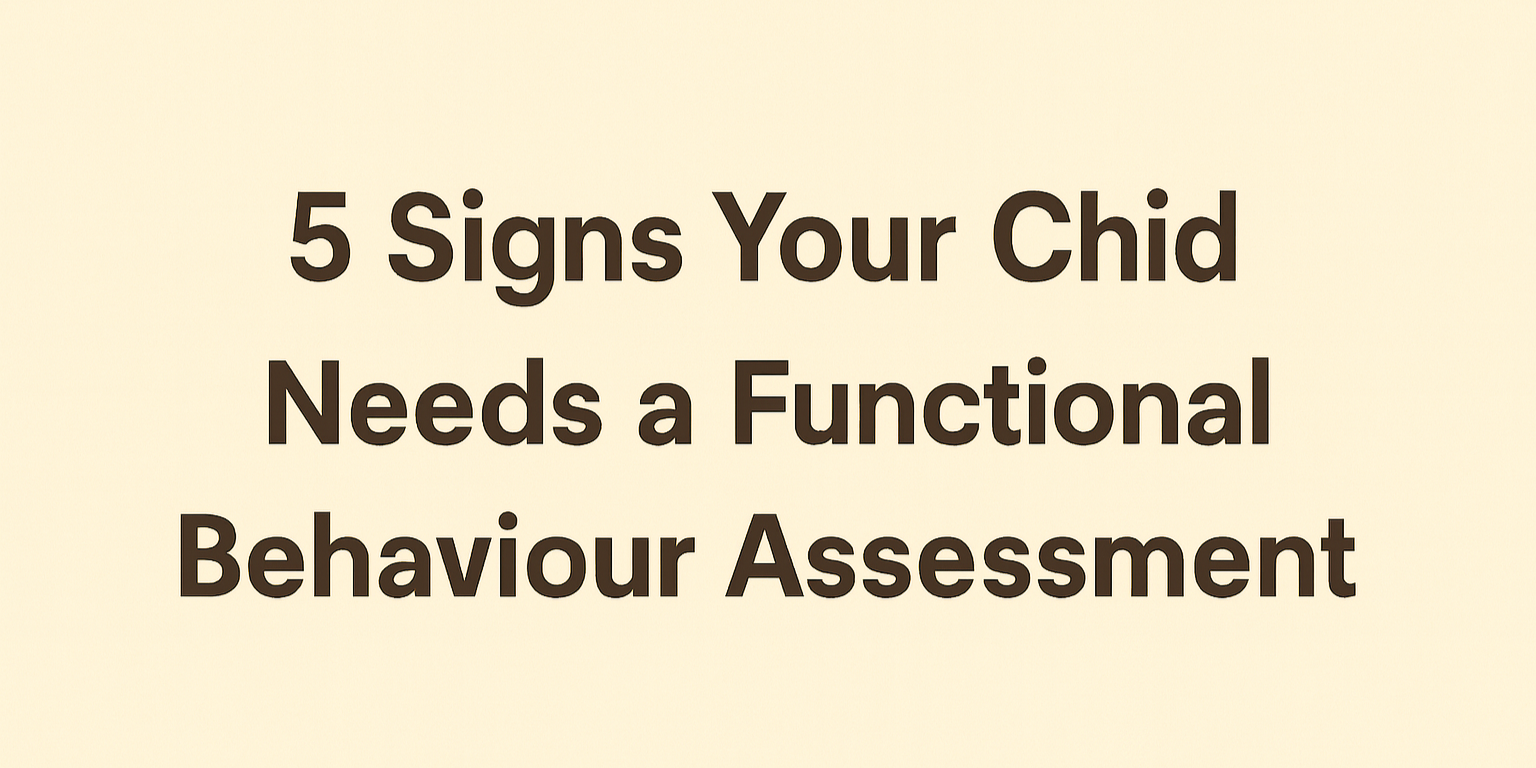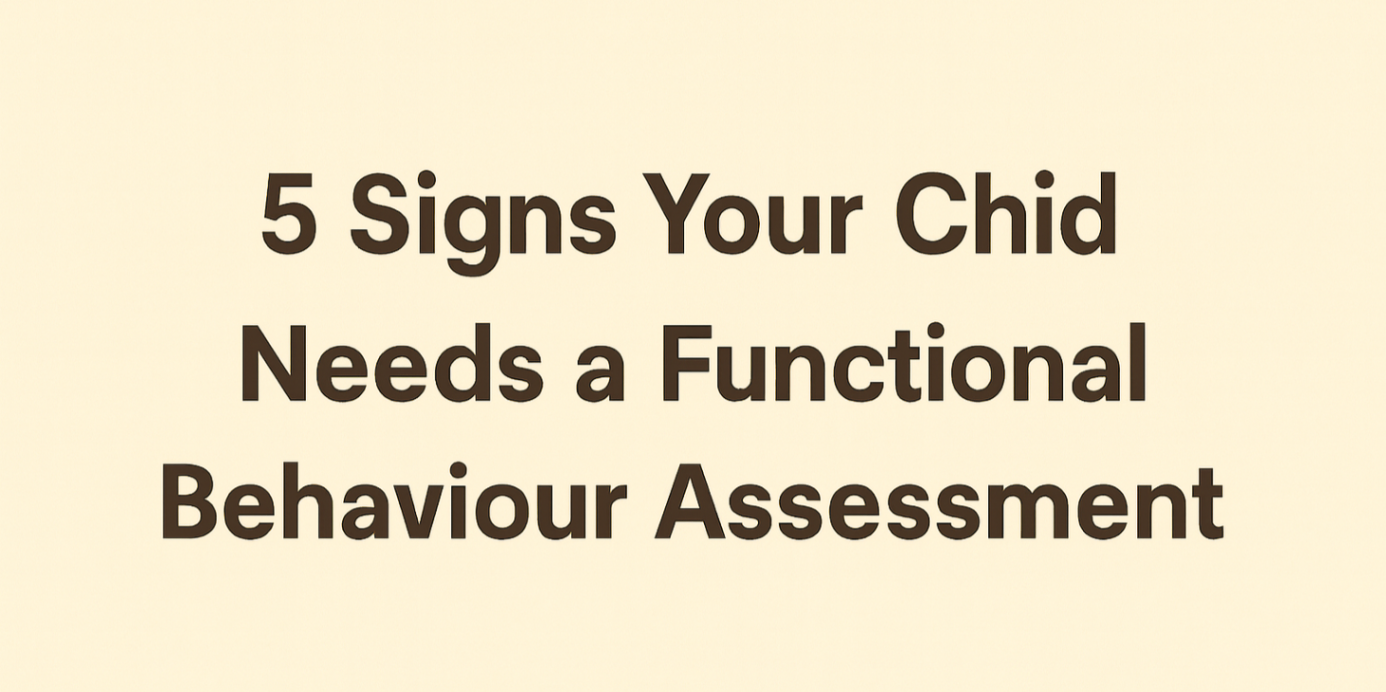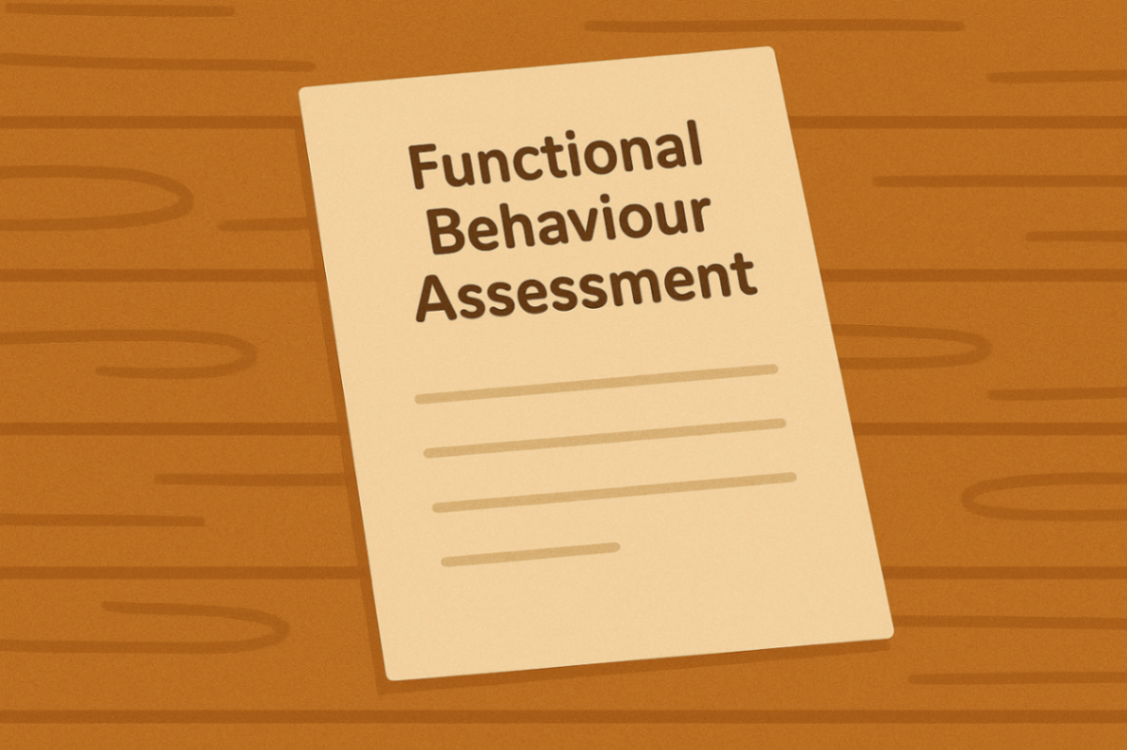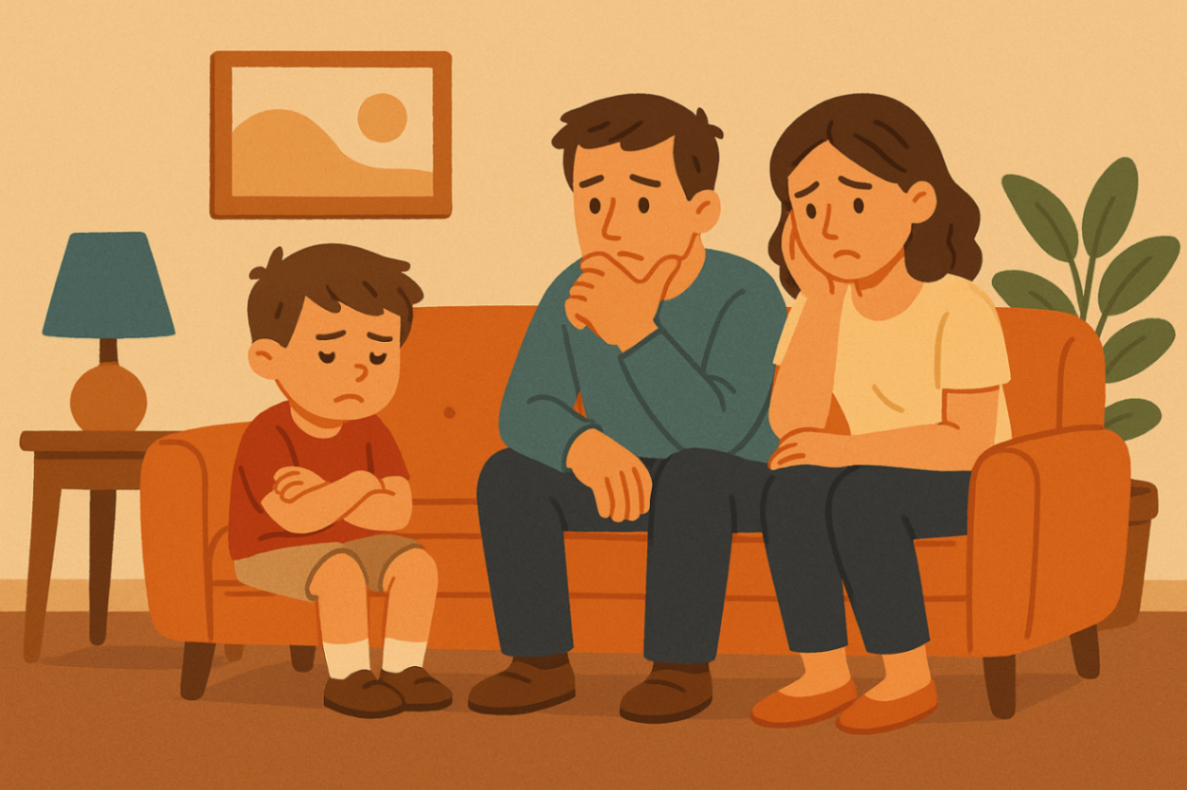
5 signs your child needs a functional behaviour assessment
28 July, 2025

Key Highlights
-
Functional Behaviour Assessments (FBAs) are used to identify the root cause of challenging behaviours and create tailored solutions to improve positive behaviour.
-
FBAs promote quality of life by implementing positive behaviour support strategies and reinforcement methods.
-
Early identification through an FBA enables school staff and caregivers to address current problems before they worsen.
-
These assessments play a critical role in managing a range of conditions, including ADHD, PTSD, and OCD.
-
FBAs foster collaboration among educators, school staff, and families to ensure lasting and meaningful change.
Introduction
Knowing why your child acts a certain way is important to help make their quality of life better. A Functional Behaviour Assessment (FBA) is a step-by-step process that looks at current problems in behaviour and tries to find out why they happen. In an FBA, caregivers and school staff work together. This team can make real plans to help your child show more good behaviour and have fewer disruptions.
FBAs can help with things such as aggression or being alone too much. They use reinforcement to help your child change in a good way. An FBA can guide you to use the best actions to help your child get better at home and school.
What Is a Functional Behaviour Assessment?
 A Functional Behaviour Assessment, or FBA, is a process to find out why a child acts in certain ways. In this assessment, people look at the child’s behaviour and get data from different places. They also see the child in many settings to see what things in the environment may cause or change the behaviour. The goal is to use this information to make plans that work and help them do better.
A Functional Behaviour Assessment, or FBA, is a process to find out why a child acts in certain ways. In this assessment, people look at the child’s behaviour and get data from different places. They also see the child in many settings to see what things in the environment may cause or change the behaviour. The goal is to use this information to make plans that work and help them do better.
Why Early Intervention Matters for Behaviour Support
Seeing behaviour problems early is important for giving positive reinforcement and protecting the quality of life for each child. If school staff and caregivers notice issues soon, they can use support that fits that child, like positive behaviour support. This helps before problems get bigger. When we spot things early, either in learning or with friends, we can offer help that gets kids on a better track.
When it comes to things like ADHD, PTSD, or OCD, it is helpful to handle behaviour struggles early. This works both at school and at home. Caregivers and school staff can use things like mindfulness and cognitive therapy. Methods like these can help build positive behaviours and offer reinforcement. Everyone needs to work together to give kids the support they need, so they can do well wherever they are.
Five Key Signs Your Child May Need an FBA
 Functional Behaviour Assessments help when there are behaviour problems. This can include things like ADHD or big emotional reactions that come with other conditions. If children are showing signs like acting out, quick changes in mood, trouble at school, or doing risky things, the FBA can be a big help.
Functional Behaviour Assessments help when there are behaviour problems. This can include things like ADHD or big emotional reactions that come with other conditions. If children are showing signs like acting out, quick changes in mood, trouble at school, or doing risky things, the FBA can be a big help.
An FBA works to find out what is really making these things happen. This gives caregivers and school staff the right information to help. With good support and the right behaviour therapy, kids can get more from the time they spend learning at school. It can also make their quality of life better. If we spot the problems early and help, it can change a child’s day-to-day life for the better.
Sign 1: Persistent Disruptive or Aggressive Behaviour
Frequent disruptive or aggressive behaviour can mean there are bigger problems that need more attention. This sort of behaviour often makes it hard for a child to be part of a group with school staff and other kids. It also can lower their quality of life. Using positive reinforcement and cognitive behavioural therapy (CBT) is one way to help with current problems. A behaviour support plan that adds things like mindfulness and relaxation can help make the place better for everyone. This can improve behaviour and help with emotional control.
Sign 2: Sudden Changes in Mood or Social Withdrawal
Has your child started to pull back from others or showed sudden mood changes? These shifts in how your child acts can come from PTSD, OCD, or other anxiety issues. When you see this, they may need an FBA. These mood changes might come from things around them or from feeling too much stress as they go about their day.
A Behaviour Support Plan is made after an FBA. It often uses cognitive behavioural therapy (CBT) ideas, like mindfulness and ways to help control emotion. These help with mood shifts and also support their mental health.
Giving the right help makes sure kids can get back to who they are. They start to talk and take part with others again, with help from caregivers and school staff. Both caregivers and school staff are key in making sure kids can adjust. It is best to find and act on these changes early. Doing this gives your child the best chance to get better and feel good for a long time.
Sign 3: Declining Academic Performance Linked to Behaviour
A big drop in how well a student does at school can often happen with behaviour problems. This can be caused by many things. Some reasons are not getting enough positive reinforcement in the classroom or having problems with ADHD. Making a structured behaviour support plan can help boost engagement and lead to better results. Using ideas from cognitive behavioural therapy (CBT), like mindfulness and relaxation, can also help the child pay attention better. Changing behaviour with these steps does not just help bring up grades. It can also make their quality of life much better.
Sign 4: Difficulty Following Routines
Having a hard time sticking to routines is often a sign that someone could have behavioural or mental health problems. This can happen because of feeling too much from the senses, having ADHD, or things that make it hard to focus and follow through.
Positive Behaviour Support steps, like using regular reinforcement and relaxation methods, can help a child go from one task to the next with less trouble. Doing an FBA helps caregivers and school staff find the things around the child or different situations that make these problems worse.
Being steady and using specific plans with reinforcement help support good behaviours. This lowers stress about routines and helps a child make habits that work both at home and at school.
Sign 5: Unsafe or Risky Behaviour
Unsafe or risky behaviour can be a big warning sign that your child might need a functional behaviour assessment. This type of behaviour means your child or others could be in danger. It often shows deeper problems that need help, such as positive behaviour support. Using methods like cognitive behavioural therapy and mindfulness can help your child make safer choices. Caregivers need to watch these behaviours close so they can make a good behaviour support plan. This plan should make your child’s quality of life better and also keep them safe both in mind and body.
Steps to Take if You Notice These Signs

If you start to see signs that might call for an FBA, the first step is to talk with the school staff about your concerns. Work together to look into behaviour therapy options or positive behaviour supports. This team approach is key. When you and the school staff work together, you help make sure your child gets the right kind of support.
Taking these steps early lets you shape plans that fit your child’s needs. This will help your child grow and make progress in their life. When you look at problems early on, there is a better chance for your child to deal with things in a positive way.
Next, let’s walk through what unfolds in an FBA session—so you know what to expect when you book one, read our guide here on what happens during a functional behaviour assessment.
Seeking Support for NDIS Behaviour Therapy Liverpool
Accessing tailored behaviour therapy in Liverpool can be a game‑changer for caregivers and school staff alike. At daar, we offer evidence‑based approaches—including positive behaviour support—designed to meet each child’s unique needs. Whether your child is navigating ADHD, PTSD, or other challenges, our team integrates mindfulness and relaxation techniques to boost overall well‑being.
By partnering with daar, you’ll benefit from a comprehensive behaviour support plan that addresses current concerns and lays the groundwork for lasting, positive change. Let our experienced practitioners guide your family through every step, ensuring clear communication, consistent strategies, and measurable progress. We serve Liverpool families and those in Casula, Moorebank, Prestons, Chipping Norton, Green Valley, and surrounding suburbs, ensuring every child gets the tailored support they need.
Ready to see how daar can support your child’s growth? Book your consultation today and discover a brighter path forward.
Conclusion
To sum it up, knowing when your child might need a Functional Behaviour Assessment is very important for their growth and well-being. If you spot problems early, you can help your child faster. This can make it easier to handle their behaviour and be better for their learning. If you notice your child keeps acting out, has big mood changes, has trouble in school, finds it hard to follow routines, or does things that seem risky, taking action now can really help. Doing this can lead to better days for your child and your family.
Frequently Asked Questions
What professionals are involved in conducting an FBA?
Professionals such as school psychologists, behaviour specialists, and teachers are very important to FBAs. They work closely with school staff and caregivers. Together, they look into patterns in student behaviour and find ways to help students act in positive ways. They use things like PDF reports and different sets of information to help guide the work.
Can parents request an FBA in Australian schools?
Yes, caregivers can ask for an FBA if they think their child’s behaviour is getting in the way of learning. The school staff and parents work together on this. They follow federal rules and talk about ways to help. These steps are written down in documents and support plans to help your child.
How long does the FBA process usually take?
Completing an FBA usually takes a few weeks. The process includes collecting data and looking at what you find. You then make a behaviour support plan that uses positive reinforcement. School staff look over this plan. Everything is written down in a PDF.
What happens after an FBA is completed?
After an FBA is done, the team uses the findings to create a Behaviour Support Plan. This plan lists clear steps to help the person. Good behaviours get rewards, and the plan often uses CBT ideas as well. All this helps make the person’s quality of life better. Caregivers and school staff also work together to look at the plan and talk about what they can do next.
.svg)

















